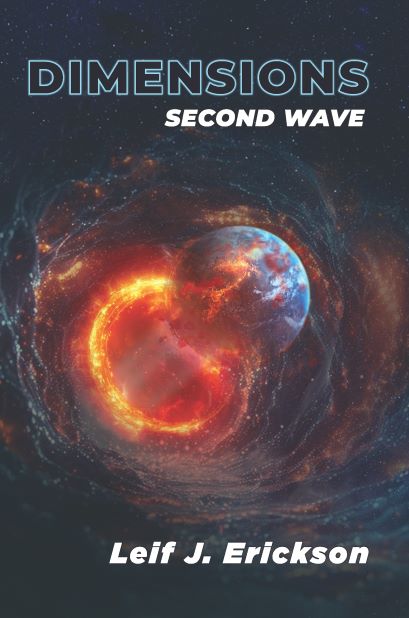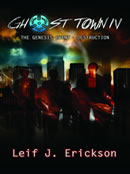Sci-Fi
Victor Miller and the Future of Cheyenne: When Life Imitates Art
In the heart of Wyoming, a political campaign is gaining national attention, not for its rhetoric but for its vision. Victor Miller, a candidate for mayor of Cheyenne, is advocating for something straight out of a science fiction novel: using A.I. to help run the city. As a science fiction author who once penned Winter Falls, a novel about a small Midwestern town that handed control of its governance to an A.I., I can't help but marvel at how reality is catching up with fiction.
Victor Miller’s Vision and Chances of Winning
Victor Miller is not your average politician. With a background in technology and a passion for innovation, he’s pushing a platform that seeks to integrate A.I. into the very fabric of city governance. His campaign promises a more efficient, transparent, and responsive local government, with A.I. at the helm of data analysis, resource management, and even decision-making processes. According to Miller, this will allow Cheyenne to run like a well-oiled machine, free from the biases and inefficiencies that often plague human-led administrations.
But can Miller win? On the surface, his platform might seem too radical for a city like Cheyenne, which is known more for its cowboy heritage than its tech-savvy innovations. However, there is a growing demographic of younger, more tech-oriented voters in Cheyenne who are intrigued by the idea of a city that embraces the future. Additionally, Miller’s emphasis on using A.I. to reduce waste, lower taxes, and improve public services resonates with voters tired of the status quo. While he faces stiff competition from more traditional candidates, Miller’s message is gaining traction, and his chances of winning shouldn’t be underestimated.
Cheyenne Under A.I.: A Glimpse into the Future
If Victor Miller wins and implements his vision, Cheyenne could become a case study in the use of A.I. in municipal governance. Imagine a city where traffic lights are dynamically adjusted in real-time to reduce congestion, where public utilities are managed with pinpoint efficiency, and where citizen concerns are addressed faster and more accurately than ever before. A.I. could analyze vast amounts of data to predict and mitigate issues before they become problems, from crime hotspots to infrastructure failures.
However, this future is not without its challenges. The integration of A.I. into city governance raises questions about privacy, accountability, and the potential for algorithmic bias. Who would be responsible if an A.I. system makes a flawed decision? How would citizens’ data be protected? And what happens if the technology fails or is hacked? These are questions that Cheyenne—and the rest of the world—would need to answer as it navigates this new frontier.
A Broader Look: A.I. in City Governance and the Art of Science Fiction
The concept of A.I. running a city is not just a futuristic fantasy; it’s an idea that has been explored in science fiction for decades. My novel Winter Falls delved into the potential benefits and pitfalls of such a system long before Victor Miller’s campaign was even a glimmer on the political horizon. In the novel, the town’s A.I. governance brought about unprecedented efficiency and prosperity, but it also led to unforeseen consequences, including a loss of human connection and a growing divide between the citizens and the technology that controlled their lives.
The idea of life imitating art is more relevant than ever as we see Miller’s proposal echoing the themes of Winter Falls. The novel’s exploration of the balance between technological efficiency and human values is a cautionary tale for any city considering such a leap. A.I. has the potential to revolutionize how we manage our cities, but it must be implemented with care, foresight, and a deep understanding of its implications.
Conclusion: The Intersection of Innovation and Responsibility
Victor Miller’s campaign is a fascinating intersection of innovation and responsibility, where the promise of a more efficient future meets the complexities of human governance. Whether or not he wins, his ideas are pushing the boundaries of what we consider possible in city management. As a science fiction author, it’s thrilling to see concepts once confined to the realm of fiction begin to take root in reality. But as with any leap into the unknown, we must tread carefully, ensuring that our pursuit of progress does not come at the expense of the very humanity that makes our cities worth improving.
In the end, Cheyenne might just become the testing ground for a new era of governance—one where the lines between human and machine blur, and where the future, once imagined, becomes the present.
About Leif J. Erickson
Leif J. Erickson is a science fiction and fantasy author from a small farming community in west central Minnesota. Using his time wisely when he was a farmer, Leif developed many ideas, characters, and storylines to create over fifty unique first drafts and outlines for stories. From his start in a small town school, to college at North Dakota State University, back to his family farm, then to the bright lights of Minneapolis, Minnesota, and back to his small farming town, Leif has always had a love of writing.
When Leif isn’t writing he can be found with his wife hiking in state parks, canoeing local lakes and rivers, exploring local and regional ghost towns, experiencing museums, or simply reading or hanging out with friends and family. Leif draws on the local nature and ecology to find inspiration for his writing while he also asks what’s possible for technology and the human race, weaving them together for amazing stories that will stay with the reader for years to come. Leif looks forward to having many novel and story releases in the years to come.
You can see all of Leif’s Books here: Leif’s Amazon Author Page





























Leave a reply
You must be logged in to post a comment.